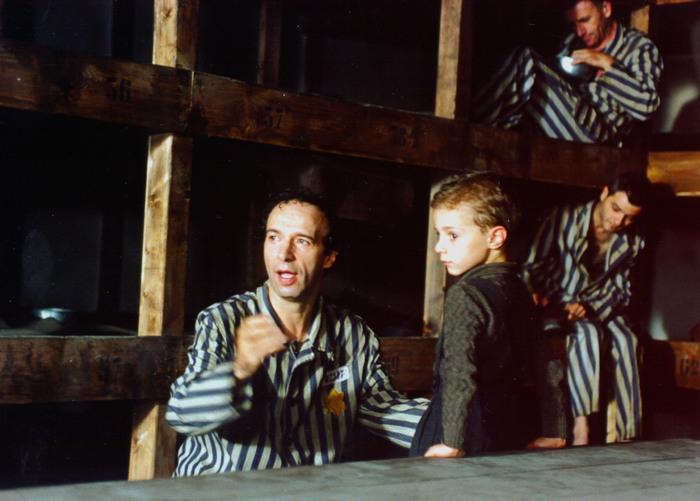On the anniversary of the Day of Remembrance, here is a journey through the films that recall the horror of the genocide of the Jews perpetrated by the Nazis and their allies before and during the Second World War. There is a very wide filmography to choose from and then it is appropriate to propose a double ranking: the 10 films that, for popularity and accessibility, cannot be missing and 10 others that instead require more passion and research, but ultimately hide surprises or discoveries not to be missed. It must be said in the introduction that two securities are considered "out of quota". The first, because it is the progenitor of the whole genre (if one can speak of gender), and is THE DIARY OF ANNA FRANK directed by George Stevens in 1959, 14 years after the death of the Dutch girl and made with much more verisimilitude than you might expect from a Hollywood product by following the pages of the original diary step by step. The second is of course SCHINDLER'S LIST by Steven Spielberg (1993). It is a work that the creator of great fairy tales like "ET" dedicates to his people, with modest visual sensitivity (it is shot in black & white except for a few touches of color here and there and two dazzling shots that illuminate the coat of a child) and documentary scruple in reconstructing the odyssey of Oskar Schindler, remembered among the Righteous of the Nations for the tenacity with which he rescued hundreds of condemned from genocide in concentration camps. The clamor aroused by the film allowed Spielberg to use part of the proceeds to create the "Survivors of the Shoah Visual History Foundation", a non-profit organization for the audio-video collection of the testimonies of about fifty-two thousand survivors. The director Mimmo Calopreste also participated in the project for Italy. The two films can be viewed easily, by subscription, on Prime Video or even on other platforms.
The list of films to see or review opens with SHOAH, a tale of persecution and extermination camps filmed with relentless objectivity by Claude Lanzmann between 1974 and 1985. They are nine hours without any footage, but full of testimony and truth. historical. Then here is a multi-award-winning and exciting film such as the autobiographical IL PIANISTA by Roman Polanski, winner of 3 Oscars in 2003. In third place another Oscar winner, LA VITA E 'BELLA by Roberto Benigni (1997) to which the film he made by Gillo Pontecorvo a great international director, KAPO '(1959), who was also awarded an Oscar. There are those who, being Jewish, can also smile at the tragedy of genocide: it is Radu Mihaileanu who in 1998 directs the irresistible TRAIN DE VIE. Let's go back to Italy with a famous novel, which became a film thanks to Vittorio De Sica in 1970, IL GIARDINO DEI FINZI CONTINI. He likes to place one of the most fascinating and ambitious films of the same decade alongside him, namely MR. KLEIN (1976) by Joseph Losey with Alain Delon, victim and witness of the Nazi persecutions in France. Then there is an international success such as THE CHOICE OF SOPHIE (1982), directed by Alan Pakula from the novel by William Styron with an unforgettable Meryl Streep. Far more raw and dramatic THE SON OF SAUL by László Nemes, awarded at Cannes in 2015. And finally the "classic of the classics", THE GREAT DICTATOR by Charlie Chaplin, directed in 1940 and conceived as a relentless indictment of Nazi madness, managed with the strongest weapon: satire that becomes art and universal warning.
The second "playlist" is much more subjective and opens with a documentary that in 1956 caused a sensation and revealed a great director: NIGHT AND FOG by Alain Resnais. It is the first documented journey into the memory of that tragedy that the public was able to know. Only later were the filming of the death camps with the signature of Alfred Hitchcock disclosed and never shown for the horror they aroused. We remain in the field of the documentary with the recent 1938: DIVERSI, directed by Giorgio Treves two years ago and in which the odyssey of Italian Jews is told after the racial laws wanted by Mussolini in that year. To fully understand what the invisible barrier between "Jews" and "gentiles" was in the Europe of Nazi-Fascism, here are two exemplary films: ARRIVEDERCI RAGAZZI by Louis Malle, awarded with the Golden Lion in 1987, and JONA CHE LIVED IN THE WHALE (1993) by Roberto Faenza. Can the reality of history be changed with the creative freedom of cinema? Quentin Tarantino's paradoxical answer is BASTARDS WITHOUT GLORY (2009), on the trail of Shosanna Dreyfus, the little girl who escaped the massacre of her family and then relentless avenger. Even more extreme is the provocation of New Zealander Taika Waititi (from a Jewish family) in JO JO RABBIT of 2019. Among the many good films dedicated to the memory of the Holocaust, he still likes to propose THE READER (2008) by Stephen Daldry which tells about love and Michael Berg's (Ralph Fiennes) awareness of Hanna (Kate Winslet) in which, after many years, he recognizes a former SS, a concentration camp guard, then tried, sentenced and repented. In a more romantic and adolescent key, here is IL VIAGGIO DI FANNY (2016) directed by Lola Doillon with the eyes of a girl fleeing persecution between France and Switzerland. All the films mentioned are available on the market. In closing instead, two rarer titles to be discovered: SENZA DESTINO (2005) by Lajos Koltai (the terrible story of a Hungarian family that knew all the most famous concentration camps, from Mauthausen to Auschwitz and Buchenwald) and CORRI RAGAZZO CORRI (2013) by Pepe Danquart (the true story of a boy fleeing the Warsaw ghetto).
(HANDLE).

